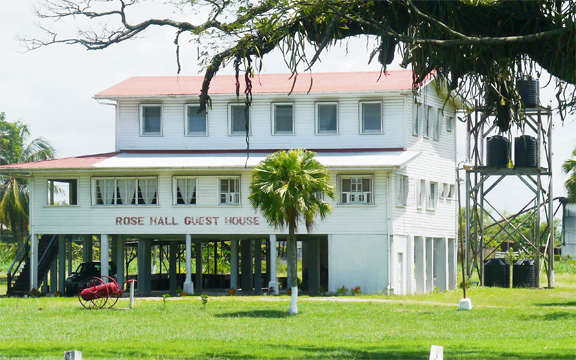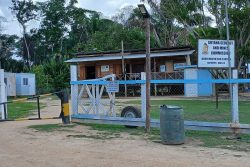Quite a few indentured labourers who were brought from India were placed at Rose Hall sugar plantation, East Canje. Among them was Nibur Singh, the grandfather of 69-year-old Sherlock Sukdeo. Singh believed in fighting for his rights and was among 15 workers who were killed in 1913 while protesting for better conditions. Included among the slain workers were Durga, 72, Laljie, 45, and a lone female, 32-year-old Gobindei. The others were in their 20s and 30s. Forty-one workers were also injured from the 100 shots that were fired.
On March 17 there was a celebration to mark the 100 years of martyrdom. In a large open plot, a monument was erected in memory of the fallen workers.
Today most of the residents are employed at the estate in the field, factory, workshop or office while some operate businesses like grocery and rum shops and the Uprising Bar & Dance Club. The village has a nursery and primary school and a church.
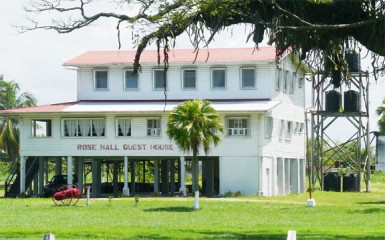 The well populated village is dominated by the estate’s factory, senior staff compound, health centre, guest house and community centre ground. What was in evidence too was a number of colonial-style houses.
The well populated village is dominated by the estate’s factory, senior staff compound, health centre, guest house and community centre ground. What was in evidence too was a number of colonial-style houses.
At the time of this newspaper’s visit students from various primary schools in East Berbice as well as first-formers from secondary schools were sitting in the two huge pavilions at the community centre waiting for the start of a windball cricket match.
A few others were in a corner of the ground warming up before the game started as teachers and representatives from the Ministry of Culture, Youth & Sport got the pitch ready. A photographer from the ministry and a bus driver who had transported some of the students were also there looking on. It had rained a lot earlier that morning but thankfully the weather turned out in their favour.
A ministry representative told this newspaper that based on the students’ performances, some of the “boys and girls from the primary schools would be selected to represent Guyana at a match in Trinidad.”
Around 11.45 am there was the loud whistling from the estate’s clock to alert them to their approaching lunch break. At noon, the whistle sounded again.
Residents said that the clock would also whistle in the mornings at 6.30, 6.45 and at 7 and in the afternoons when it is time to leave work.

Some did not mind the whistling but others thought it was too “old-fashioned” and should be gotten rid of because “the noise was annoying. These are modern times when everyone has watches so they don’t need that…”
Migrated
Sukdeo who migrated to Canada in 1976 returned home for the event that was attended by President Donald Ramotar, as well as to spend time with relatives.
He said proudly that his grandfather was the only person who has surviving relatives in the village. Most of the other residents have migrated.
His father, Thomas Sukdeo was a baby when his grandfather was killed. His grandmother, a local, continued working on the plantation and struggled to raise her seven children, four of whom became doctors. His father, a very influential person, undertook a lot of private studies and rose to become the chief book-keeper on the estate. Sukdeo recalled living in a logie while growing up, and said life back then was much busier with labourers seen everywhere.
There was also the jostling from a big market that was located close to his home. The sugar plantation was more vibrant and busy and there was more manual work. The village still has a market but at another spot, operating on Friday afternoons.
He has seen a lot of development in the village but “cannot stand the noise pollution,” from vehicles blasting music at any hour. He remembered that in his day “persons earned their livelihood from working on the sugar industry and from farming. In my time it was under the British colony. The whites were very good people and they maintained a very good standard… I wish if they were still the serving rulers of this country.”
He said too that “the British gave us the best hospitals; they had a hospital here [in the village] and a school [St Patrick’s].” Looking across from his veranda he pointed to huge trees that had been in the estate compound since he was a little boy. He also showed this reporter a tree that was said to be over 200 years old, and said “they preserved them well.”

He worked for a while with the Guyana Police Force. He was also employed at the McMaster University in Canada for over 30 years, doing administrative duties. He was presented with the President’s Award for his outstanding service.
His sisters, Devi Mohabir and Pamela Badley were downstairs enjoying the breeze. Their dog had rushed to the gate when this newspaper called and they had to lock it away before I entered.
Devi said their house is “from the colonial days in the former junior staff compound. We did not change the pattern since then because it is quite spacious and comfortable.”
Pamela rocked her granddaughter to sleep in a hammock and after the child fell asleep she took her to her bed in the upper flat.
A retired headmistress with over 20 years of service to the community, she currently serves as a Caribbean Secondary Education Certificate (CSEC) examiner, which she has been doing for 30 years, marking papers in Barbados. She worked at the St Joseph’s High School for 10 years before returning to serve in Berbice. She still participates in community, religious and social activities.
She joined the teaching profession at age 22 after graduating from the University of Guyana and since then has always been “dealing with teenagers.” A specialist in English ‘A’ and ‘B,’ she still enjoys teaching and mentoring teenagers and conducts lessons for those preparing for the CSEC exams. She noted that the teenagers are “different from then to now; you have to understand them, be firm and you can have a good relationship with them.”
Apart from that she loves flowering plants and spends “a lot of time, effort and money to groom them.” She likes to keep her yard “in a relaxing atmosphere.”
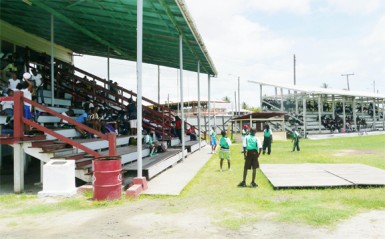
Sign
There is a no-alcohol sign in front of the estate which reads, “Too many families… Too many lives are lost or destroyed. Alcohol abuse destroys lives!” One wonders if the sign has impacted on the lives of sugar workers many of whom are known for their liberal consumption of alcohol.
A truck pulls up in front of the estate to drop off some workers who had just completed their tasks in the fields. Ramkhellawan Singh, 50, an excavator/chargehand was heading home carrying his umbrella and lunch bag. He has been working at the estate for 27 years in “reasonable condition.” He first worked as a cane-harvester, then in the now disbanded dairy section where he milked cows, as well as with the “fertilizing gang.” The milk was sold to sugar workers.
Renita Shabudin who operates a liquor restaurant with her husband, was sitting at the side of her house with a few friends and relatives. They were helping her to prepare fish cakes and wild meat which she sells as “cutters” to her customers.
She moved from the neighbouring village of Reliance four years ago. She is renting the colonial-style house/business place from owners who reside overseas. It is supposed to be the oldest in the village. The original pattern has been preserved and when this newspaper visited it was being repainted.
Renita’s two children attend the nursery and primary schools in the village. The business has been keeping her very busy and she said when she needs a rest she has to “close the shop, but even then “customers would still call and I have to please them.”
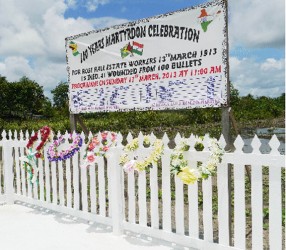
protest for better conditions
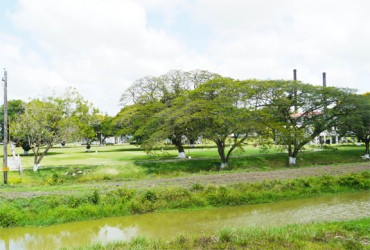
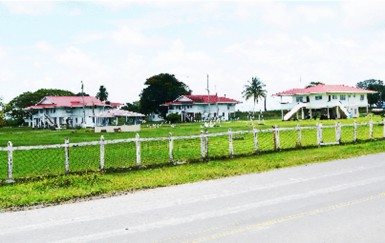

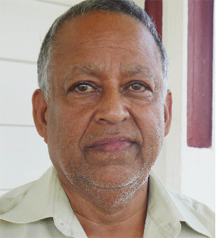
Sukdeo
